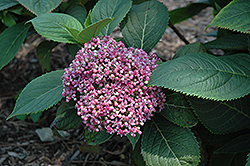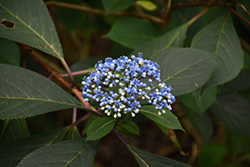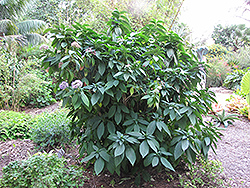It's all about ...
plants

Height: 8 feet
Spread: 5 feet
Sunlight:
![]()
![]()
Hardiness Zone: 8b
Other Names: Hydrangea versicolor, Chinese Quinine
Description:
An exotic evergreen shrub from the hydrangea family; branches hold large clusters of pretty lilac-pale blue flowers that open from white buds; the blue shade is determined by the soil pH, more acidic produces deeper blue
Ornamental Features
Evergreen Hydrangea is smothered in stunning clusters of lilac purple star-shaped flowers at the ends of the branches from mid spring to early summer, which emerge from distinctive white flower buds. The flowers are excellent for cutting. It has attractive dark green evergreen foliage. The serrated oval leaves are highly ornamental and remain dark green throughout the winter. It features an abundance of magnificent steel blue berries in late summer.
Landscape Attributes
Evergreen Hydrangea is a multi-stemmed evergreen shrub with a mounded form. Its average texture blends into the landscape, but can be balanced by one or two finer or coarser trees or shrubs for an effective composition.
This shrub will require occasional maintenance and upkeep, and usually looks its best without pruning, although it will tolerate pruning. It is a good choice for attracting bees and butterflies to your yard. It has no significant negative characteristics.
Evergreen Hydrangea is recommended for the following landscape applications;
- Accent
- Mass Planting
- General Garden Use
Planting & Growing
Evergreen Hydrangea will grow to be about 8 feet tall at maturity, with a spread of 5 feet. It has a low canopy with a typical clearance of 1 foot from the ground, and is suitable for planting under power lines. It grows at a medium rate, and under ideal conditions can be expected to live for 40 years or more.
This shrub does best in partial shade to shade. It does best in average to evenly moist conditions, but will not tolerate standing water. It is particular about its soil conditions, with a strong preference for rich, acidic soils. It is somewhat tolerant of urban pollution, and will benefit from being planted in a relatively sheltered location. This species is not originally from North America.
This plant is not reliably hardy in our region, and certain restrictions may apply; contact the store for more information.


